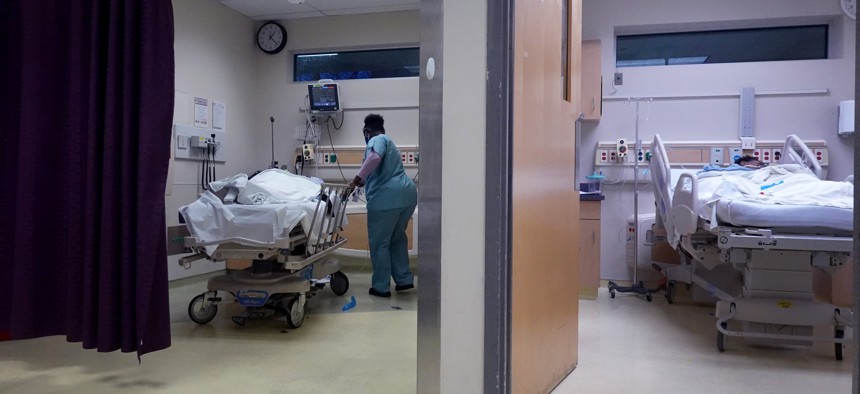A Local Government Plans to Pay Off Millions in Residents' Medical Debt

Patients receive care at a Chicago area hospital in December 2020. Photo by Scott Olson/Getty Images
Cook County, Illinois, where Chicago is located, is launching the initiative using American Rescue Plan dollars and hopes to wipe out hundreds of millions of dollars in unpaid bills.
Cook County, Illinois, is planning to use $12 million of its federal pandemic aid from the American Rescue Plan Act to launch a new program that will pay off local residents' medical debts.
Because medical debt can be purchased at discounted rates, the thinking is that the $12 million could possibly be stretched to pay off hundreds of millions of dollars people owe to health care providers.
"There's a real multiplier effect," Cook County Board President Toni Preckwinkle said during an interview with Route Fifty at a National Association of Counties meeting in Denver.
County leaders believe the initiative is first of its kind. It seeks to address a major source of financial pressure for many Americans—one that tends to fall more heavily on racial and ethnic minorities, lower-income families and people with chronic health problems.
Preckwinkle explained that a notable aspect of the initiative is residents will not have to apply. Instead, the program will go directly to hospitals and debt collectors to settle peoples' bills, then send residents notices informing them that their debt has been erased.
The county board is set to approve a contract at a meeting next week with a nonprofit, RIP Medical Debt, that will work with the local government to design and administer the program. RIP Medical Debt typically uses donations to buy and wipe out bundles of medical debt.
Data from the Urban Institute updated in June indicate that about 13% of Cook County residents have medical debt in collections and that the median amount of the money they owe is $587. For areas in the county where at least 60% of residents are people of color, those metrics rise to 19% and $617.
A Kaiser Family Foundation study published in March estimated that nearly one in 10 U.S. adults, or about 23 million people, owe medical debt, with 11 million owing more than $2,000. People in poor health and those with disabilities were among the most likely to owe.
The research showed that Americans' collective medical debt in 2019 was around $195 billion.
'Transformative' Initiatives
Cook County's medical debt repayment program is one of three "transformative" initiatives the county is using ARPA funds to pay for, Preckwinkle said.
Another is a $42 million guaranteed income program that will deliver $500 monthly payments to about 3,000 households for two years. The third involves increased investments in behavioral health programs, including a new bureau in the county's health department, to assist people with substance abuse and mental health difficulties.
Preckwinkle credited the county's direct aid from ARPA, which totaled around $1 billion, for enabling it to launch the new programs.
"They're outside of what we normally have done, or what we even would have considered because we didn't have the resources," she said. "The federal government hasn't invested this much in local government and our residents since the Great Depression," she added. "This gives local government an opportunity to try different things."
An initial step with the medical debt program will be determining how much medical debt exists in the county and in what amounts. It's unclear at this point whether the program will try to pay down more debts that are smaller in size, or fewer larger-sized debts.
Income eligibility requirements for the program are expected to be 400% of the federal poverty level, an amount that works out to about $111,000 for a family of four this year.
"This is basically something for working families," Preckwinkle said.






